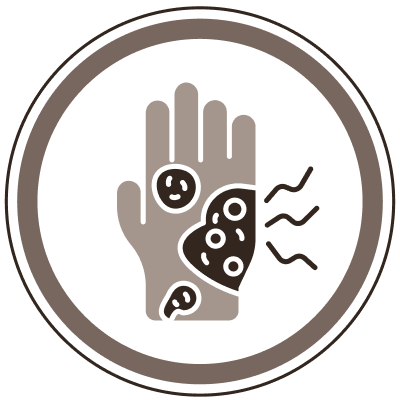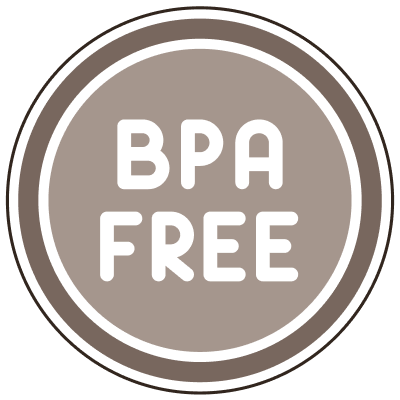What is Probiotics?
Probiotics literally means "for life. They are live bacteria and yeasts that have a positive influence on the digestive tract and, therefore, on the immune system. In addition to probiotics, there are also prebiotics, which stimulate the growth and activity of probiotics in the colon. It is important to note that probiotics are strain-specific, meaning that different types of probiotics work in the body in different ways. The most common groups of probiotics are:
- Lactobacillus
- Bifidobacterium
- Streptococcus
- Saccharomyces boulardii
Each group has a unique effect on the body.
My Experience with Probiotics as a Baby Coach and Neonatology Nurse
My name is Danielle Kempers, and I am a baby coach, neonatology nurse and the proud owner of Moalie. With years of experience caring for little ones, I specialize in supporting parents and their babies during the most vulnerable and important moments in their lives. My passion for babies and their well-being, combined with my extensive knowledge as a neonatology nurse, allows me to guide parents with expert advice and practical tips.
At Moalie I offer not only professional care, but also a warm, personal approach, where the well-being of both baby and parent is always paramount. Probiotics play an important role in this, both for the baby and the mother. I recommend starting to take probiotics during pregnancy so that your baby has a stronger gut flora from birth. Even after birth, probiotics can provide numerous benefits, such as reduced susceptibility to infection and improved digestion.
Gut Flora and Babies
The composition of the gut flora in newborns is crucial to the healthy development of their immune system. Allergies, food hypersensitivities, and other immune system disorders are closely related to gut flora development. Babies are born with a sterile gut, and during a vaginal birth they are exposed to their mother's bacteria. In the first days of life, gut flora is further formed by environmental exposure, skin-to-skin contact, and nutrition.
Babies born by cesarean section lack this exposure to the vaginal flora, resulting in a different composition of the intestinal flora. The choice between breastfeeding and formula also plays a role; breast milk contains different bacteria than formula. Fortunately, formula is increasingly enriched with probiotics these days, and some hospitals even apply a "vaginal swap" during cesarean deliveries to colonize the baby with the bacteria they would otherwise receive through natural delivery.

The benefits of probiotics
- A strong(er) immune system : this makes a baby less susceptible to disease.
- Less risk of skin conditions such as eczema
- Less risk of food hypersensitivities and allergies such as Cow's Milk Protein Allergy
- Less chance of thrush
- Less chance of colic and constipation
- Better absorption of nutrients
- Fewer infections; Research shows that when children receive probiotics the 1st year of life, they experience fewer infections
- Less reflux symptoms
- Less crying
- In premature babies, probiotics have been shown to protect against the intestinal disease NEC (necrotizing entero colitis ). Therefore, all premature babies under 30 weeks in NL are now given probiotics every day.
Probiotics in Reflux
In babies who are given probiotics during the first 3 months, these children have been found to have fewer reflux symptoms. Because the intestines function better with probiotics, this has a beneficial effect on digestion. The food is digested better and also stays in the stomach for less time.

The effect of probiotics on a baby's crying
Babies' crying has also been found to decrease significantly when babies are given probiotics. Studies have shown that crying babies have a different gut flora than "non-crying babies. Crying babies were found to have fewer Lactobacilli in their stool. In one study, babies were given probiotic containing Lactobacilli and after a week the time the babies cried per day decreased . Many naturopathic doctors even go so far as to claim that probiotics are the only treatment for excessive crying. My experience is that it certainly has an impact but is part of a more comprehensive approach.
Probiotics in breast milk
Probiotics are also already found in breast milk. Because of this, you can see that the gut flora of breastfed children is different from bottle-fed children.
An American study shows that breastfeeding is important for building your baby's gut flora. Babies get almost 30% of their good gut flora bacteria from breastfeeding! The special sugars in breast milk nourish the good Bifidobacterium Infantis. This essential strain of bacteria supports brain development, produces vitamins and boosts your baby's immune system. If you are breastfeeding, you can choose to take a probiotic yourself. As a result, the breast milk will also contain more probiotics for your baby and you won't have to give it to your baby separately.

-
Benefits of Probiotics for Mothers
Probiotics also provide many benefits for mothers, both during and after pregnancy:
-
During pregnancy:
- Strengthens immune system, making you less susceptible to infections.
- Reduces the risk of fungal infections.
- Helps with morning sickness by maintaining the balance of good and bad bacteria.
- Reduces the risk of gestational diabetes and helps prevent bladder infections.
- Lowers blood pressure and improves digestion.
-
After childbirth:
- May help prevent postpartum depression by supporting the connection between the brain and gut flora.
- Helps lose pregnancy pounds and reduces the risk of maternal and infant obesity.
New Insights: Probiotics and Brain Development
Recent studies have shown that probiotics not only affect the digestive and immune systems, but may also play a role in fetal brain development. Research suggests that the bacterial strain Bifidobacteriumbreve, which occurs naturally in the mother's gut, may support baby brain development by improving nutrient transport to the brain during pregnancy. This opens new possibilities for promoting infant growth and development already in utero through simple probiotic interventions (ScienceBlog.com).
-
Which Probiotics Should You Choose?
If you want to give your baby probiotics, there are several brands available. Most studies in babies have been conducted with the strain LactobacillusReuteri, so it is wise to choose a brand that contains this strain. Also pay attention to the excipients and fillers; avoid products with sugar or maltodextrin, as these can actually feed the bad bacteria.
Probiotics often come in powder form, but for example Microbiol from Vitals offers drops, which can easily be given to your baby on a spoon.





